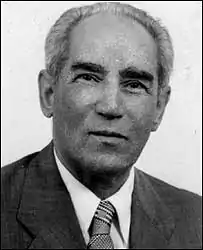Fereydoun Keshavarz
Fereydoun Keshavarz (Persian: فریدون کشاورز; 1907–2006) was an Iranian physician and communist politician.
Fereydoun Keshavarz | |
|---|---|
 | |
| Minister of Culture | |
| In office 1 August 1946 – 16 October 1946 | |
| Prime Minister | Ahmad Qavam |
| Preceded by | Mohammad-Taqi Bahar |
| Succeeded by | Ali Shayegan |
| Member of Parliament of Iran | |
| In office 7 March 1944 – 12 March 1946 | |
| Constituency | Anzali Port |
| Personal details | |
| Born | 31 August 1907 Anzali Port, Iran |
| Died | 6 October 2006 (aged 99) Switzerland |
| Political party | Tudeh Party (1941–1958) |
| Spouse | Khadijeh Keshavarz[1] |
| Alma mater | University of Toulouse |
Early life and education
The son of a merchant from Gilan who had taken part in the Persian Constitutional Revolution, Keshavarz studied in Dar ul-Funun before going to study medicine in France. He taught at University of Tehran after he returned to Iran.[2]
Career
Keshavarz entered politics in 1941, and joined Tudeh Party of Iran three months after its creation.[2] A leading member of the party, he was elected to its first central committee and served as the party's parliamentary spokesperson.[3] In the summer of 1946 he was named a minister in Qavam's coalition cabinet.[4] He broke away from the party in 1958,[5] because he came to believe that "Tudeh's policy is a betrayal of the working class".[6]
References
- Abrahamian, Ervand (1982). Iran Between Two Revolutions. Princeton University Press. pp. 335. ISBN 0-691-10134-5.
- Abrahamian, Ervand (1982). Iran Between Two Revolutions. Princeton University Press. pp. 287–288. ISBN 0-691-10134-5.
- Abrahamian, Ervand (1982). Iran Between Two Revolutions. Princeton University Press. pp. 406. ISBN 0-691-10134-5.
- Abrahamian, Ervand (1982). Iran Between Two Revolutions. Princeton University Press. pp. 303. ISBN 0-691-10134-5.
- Abrahamian, Ervand (1982). Iran Between Two Revolutions. Princeton University Press. pp. 249. ISBN 0-691-10134-5.
- Keshavarz, Fereydoun (July–August 1981). "Tudeh's Policy is a Betrayal of the Working Class". MERIP Reports (Interview). Iran Two Years After (98). Interviewed by Fred Halliday. Middle East Research and Information Project: 26–27, 31. JSTOR i350683.